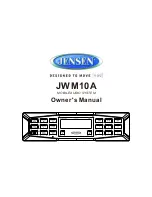
4.
To avoid unauthorised access and possible abuse of the PBX, we strongly recommend:
a.
Keeping the password secret.
b.
Selecting a complex, random password that cannot be easily guessed.
c.
Changing your password regularly.
5.
Perform the following when sending the PBX for repair or handing it over to a third party.
a.
Make a backup of data stored on the Storage Memory Card.
b.
Using a formatter, format the Storage Memory Card so that information cannot be retrieved from
it.
6.
To prevent data leakage, render the Storage Memory Card physically unusable before disposal.
7.
When user information is sent from the PBX to a PC or a USB memory device, the confidentiality of
that information becomes the responsibility of the customer. Before disposing of the PC or the USB
memory device, ensure that data cannot be retrieved from it by formatting the hard disk and/or
rendering it physically unusable.
1.1.5 Before Operating the Telephones
What Kind of Telephone Can Be Used?
You can use the following types of telephone with this PBX:
•
Panasonic IP Proprietary Telephone (IP-PT)
(e.g., KX-NT300 series, KX-NT500 series)
•
Panasonic Digital Proprietary Telephone (DPT)
(e.g., KX-T7600 series, KX-DT300 series, KX-DT500 series)
•
Panasonic Analogue Proprietary Telephone (APT)
(e.g., KX-T7700 series)
•
Panasonic Portable Station (PS)
(e.g., KX-TCA364, KX-WT125 [Canada only])
•
SIP-CS compatible Portable Station (S-PS)
(e.g., KX-UDT series)
•
SIP phone
(e.g., KX-UT series SIP phones, Third party SIP phones, P-SIP)
•
Single Line Telephone (SLT)
(e.g., rotary pulse telephone)
Which features are available depend on the type of telephone being used. If you are using a Panasonic
telephone with a special feature button such as
or a display or both, you can follow the operations
using the buttons or displayed messages for easy programming. If you use a large display telephone (e.g.,
KX-NT346 or KX-T7636), you can follow the displayed messages to use the features. If your telephone does
not have feature buttons and/or a display, you may operate the PBX by entering a feature number instead.
Follow the operation for your type of telephone.
1.1.5 Before Operating the Telephones
Operating Manual
21
Summary of Contents for KX-NS1000
Page 10: ...Feature Highlights 10 Operating Manual ...
Page 14: ...Table of Contents 14 Operating Manual ...
Page 225: ...Table 1 Standard mode 1 14 2 Using the Directories Operating Manual 225 ...
Page 226: ...Table 1 Standard mode for RU model 1 14 2 Using the Directories 226 Operating Manual ...
Page 227: ...Table 2 Option mode 1 14 2 Using the Directories Operating Manual 227 ...
Page 228: ...Table 2 Option mode for CE model 1 14 2 Using the Directories 228 Operating Manual ...
Page 229: ...Table 2 Option mode for GR model 1 14 2 Using the Directories Operating Manual 229 ...
Page 238: ...1 15 1 Cellular Phone Features 238 Operating Manual ...
Page 332: ...4 1 3 Supervisory Monitor ACD Control 332 Operating Manual ...
















































